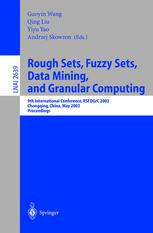

Most ebook files are in PDF format, so you can easily read them using various software such as Foxit Reader or directly on the Google Chrome browser.
Some ebook files are released by publishers in other formats such as .awz, .mobi, .epub, .fb2, etc. You may need to install specific software to read these formats on mobile/PC, such as Calibre.
Please read the tutorial at this link: https://ebookbell.com/faq
We offer FREE conversion to the popular formats you request; however, this may take some time. Therefore, right after payment, please email us, and we will try to provide the service as quickly as possible.
For some exceptional file formats or broken links (if any), please refrain from opening any disputes. Instead, email us first, and we will try to assist within a maximum of 6 hours.
EbookBell Team

0.0
0 reviewsThis volume contains the papers selected for presentation at the 9th International Conference on Rough Sets, Fuzzy Sets, Data Mining and Granular Computing (RSFDGrC 2003) held at Chongqing University of Posts and Telecommunications, Chongqing, P.R. China, May 26–29, 2003. There were 245 submissions for RSFDGrC 2003 excluding for 2 invited keynote papers and 11 invited plenary papers. Apart from the 13 invited papers, 114 papers were accepted for RSFDGrC 2003 and were included in this volume. The acceptance rate was only 46.5%. These papers were divided into 39 regular oral presentation papers (each allotted 8 pages), 47 short oral presentation papers (each allotted 4 pages) and 28 poster presentation papers (each allotted 4 pages) on the basis of reviewer evaluations. Each paper was reviewed by three referees. The conference is a continuation and expansion of the International Workshops on Rough Set Theory and Applications. In particular, this was the ninth meeting in the series and the first international conference. The aim of RSFDGrC2003 was to bring together researchers from diverse fields of expertise in order to facilitate mutual understanding and cooperation and to help in cooperative work aimed at new hybrid paradigms. It is our great pleasure to dedicate this volume to Prof. Zdzislaw Pawlak, who first introduced the basic ideas and definitions of rough sets theory over 20 years ago.